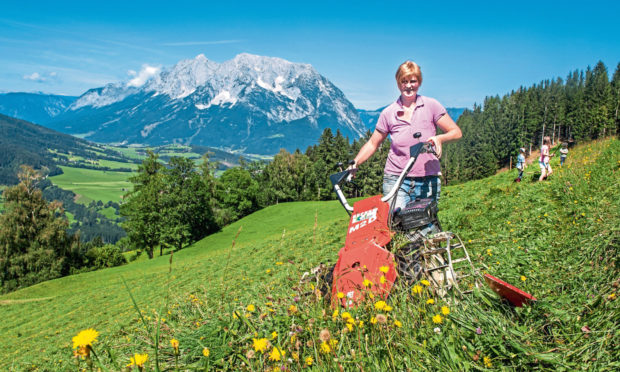Would you trust a tourist to help out on the farm?
How about getting them to lift stones? Or pull up weeds, mend fences, clean out sheds?
Then – and here’s the best bit – get them to pay for the privilege.
Judging by the (virtual – I could only imagine) wide-eyed reaction to a speech by Austria’s farm tourism chief at a conference this week, farmers find the concept very attractive indeed.
Hans Embacher of the Austrian Farm Holidays Association told the Scottish Agritourism event that visitors to his country’s farms like to help bring in the hay and do jobs with livestock in order to get an “immersive” experience. Indeed guests on Austria’s 2,200 tourist farms, which offer 27,000 lucrative beds, complain if the farm doesn’t offer opportunities that are suitably authentic.
One senior manager from Vienna, we heard, pays heftily so that he can change into blue overalls the minute he arrives on the farm and spends the next two weeks getting his hands dirty.
Austrian farms have to prove they are working units in order to be members of the national tourism association which also – in case you were wondering about the risks of scythe-wielding novices – ensures businesses are appropriately insured.
VisitScotland has just revealed a trend among prospective visitors to Scotland who want a similarly immersive holiday experience which gives them the opportunity to “live like a local” on real farms.
But there is more than profit to be gained from agritourism.
In the week the Farming for 1.5 degrees inquiry identified how Scottish agriculture could get on the front foot in meeting climate change targets, it’s a green opportunity for the industry to deliver slow, responsible tourism while also taking families to see the benefits of cattle grazing the uplands or show them the wildlife and nature on the land.
Of course climate change requires new farming practices to be adopted, scientific and technical support and the introduction of support regimes which reflect changing priorities.
But if feeding calves and pet lambs or “helping” with sheepdog training creates a closer relationship with the land and a better understanding of the practicalities of food production and caring for the countryside, it will go a long way towards getting the public on board.
And if all else fails I’d bet there’s no shortage of farmers who would willingly hand over their authentically-dirty boiler suits for a fortnight – or longer!










